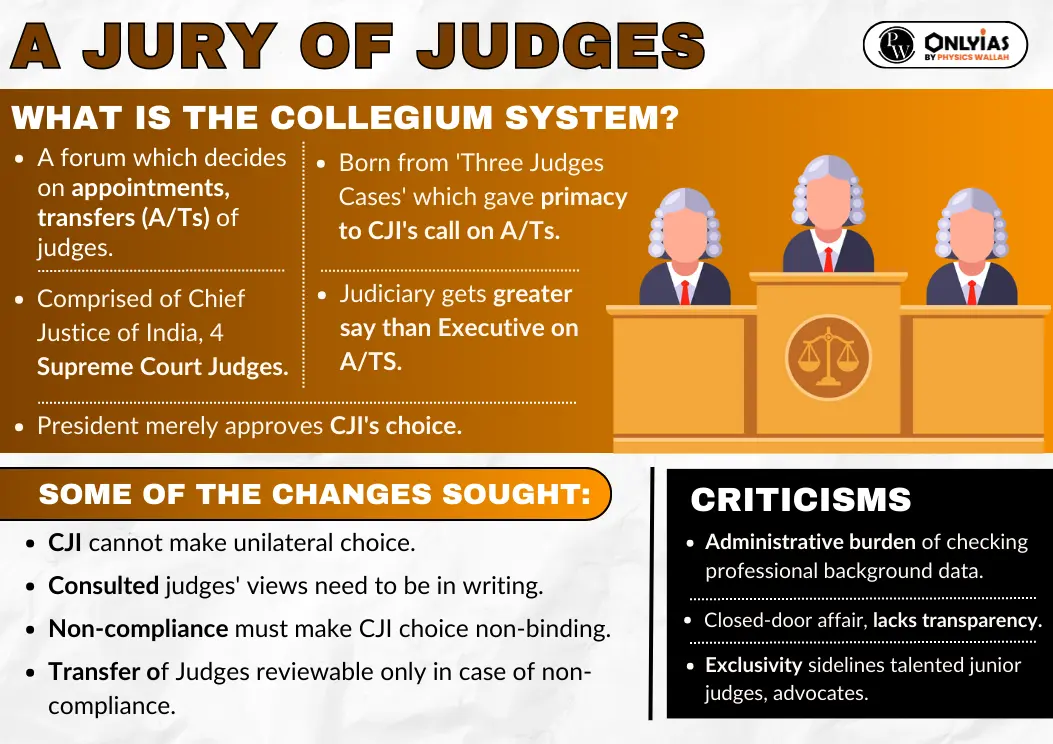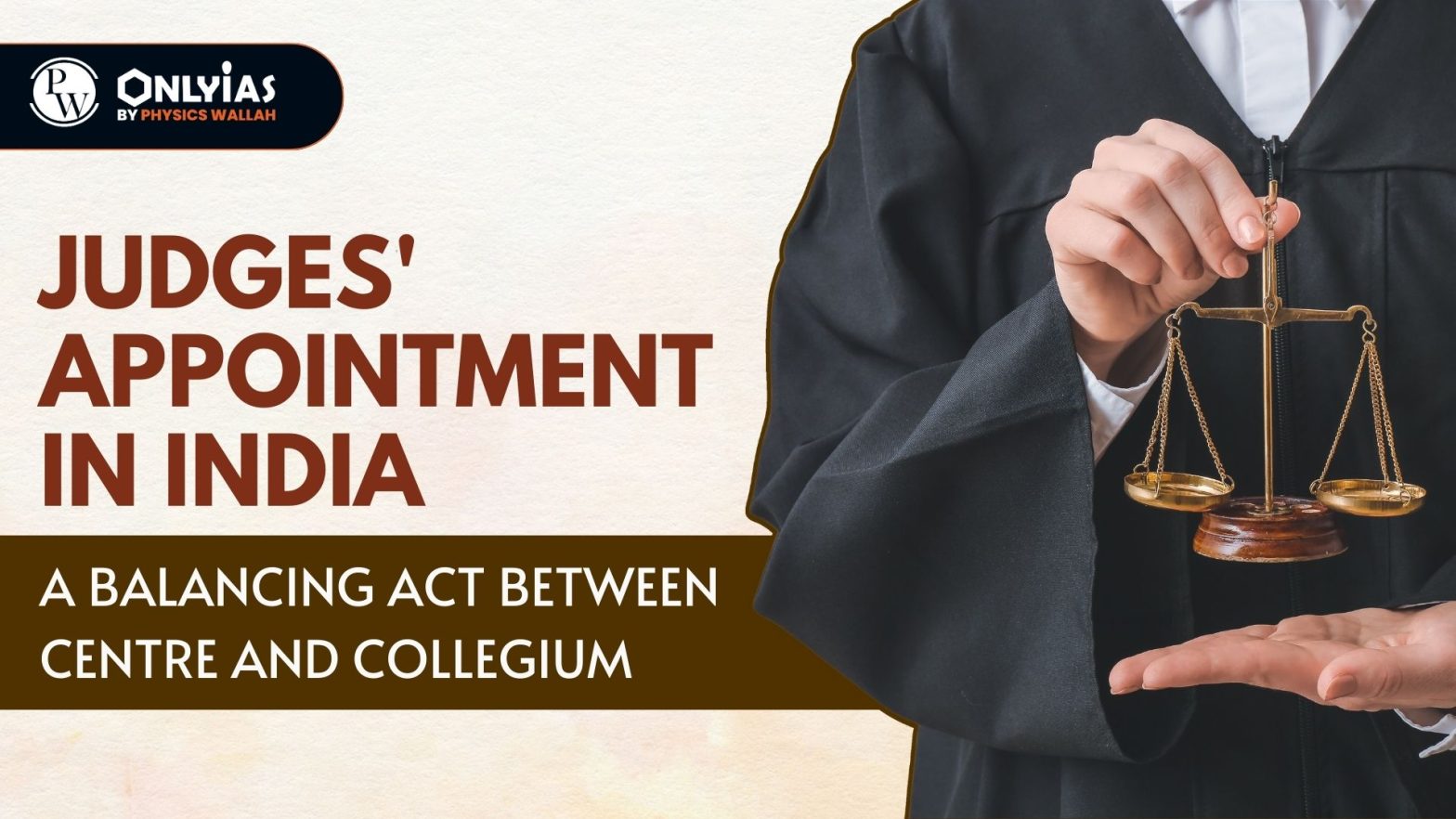Context:
- This article is based on an Editorial “Delay as tactic: On the Centre and Collegium relationship” which was published in the Hindu. Recently, the Central Government assured the Supreme Court about the appointment of Justice Siddharth Mridul of the Delhi High Court as Chief Justice (CJ) of the Manipur High Court.
- The delay in notifying the appointment of Justice Mridul was apparently due to the State government taking time to give its views on the proposal.
Timeline: Judges appointment in India
- 1950, After Constitution: President appoints judges after consultation
- 1981: First Judge Case, SP Gupta Vs. Union of India, the Supreme Court held that consultation does not mean concurrence and it only implies an exchange of views
- 1993: Second Judge Case, The Supreme Court Advocates-on-Record Association Vs Union of India
- 1998: Third Judge Case
- 2015: Formation of National Judicial Appointments Commission (NJAC) by 99th Constitutional Amendment Act
- 2015: Fourth Judge Case, Struck down NJAC
What is Article 124 of Indian Constitution appointment of Judges?
- It deals with the establishment and constitution of the Supreme Court.
- Article 124(1) states that there shall be a Supreme Court of India consisting of a Chief Justice of India and, until Parliament by law prescribes a larger number, of not more than (thirty-three) other Judges.
What is collegium?
- Collegium consists of a group of judges who checks the qualifications and suitability of the candidates.
- It is a system of appointment and transfer of judges, where judges appoint judges.
What is a collegium system?
- Through the collegium system, judges of the judiciary are appointed. It consists of:
- For the Supreme Court: The Chief Justice of India as head and four other senior most judges.
- For the High Courts: The Chief Justice of High Courts as head and four other senior most judges.

|
Also read: Same Sex Marriage In India: Supreme Court Verdict Came as a shock
What are the criticism of the collegium system in India?
- Unconstitutional and Autocratic: ‘Collegium’ is nowhere mentioned in the Constitution and has been evolved by the judiciary itself for retaining the power to select judges by itself.
- Undemocratic: Selection of judges are not elected by the people.
- Non-transparency and Opaque: As there is no official procedure for selection, lack of a written manual for functioning, selective publication of records of meetings and no eligibility criteria.
- Promotes Nepotism: Sons and nephews of previous members tend to be popular choices.
- Inefficient: Collegium has not been able to prevent the increasing cases of vacancies.
- Ignores SC’s own Guidelines: The recent supersession in appointment is inconsistent with the view of the Supreme Court in the Second Judges case, 1993, which deals with the Seniority law.
- Unless there is any strong reason to justify a departure, that order of seniority must be maintained between them while making their appointment to the Supreme Court.
- Against Established Conventions: The convention of ‘seniority’ has long been held as the procedure for appointments but ‘supersession’ ignores and abdicates this convention.
- No Reforms after the Fourth Judges Case: After striking down the NJAC, the court did nothing to amend, rather reverted to the old Collegium-based appointments mechanism.
The Path Ahead
- Transparency: The controversy over recommendations of the collegium highlights the need for collective leadership and transparent decision making in the Supreme Court.
- Appropriate Time Frame: The “thought process” of both the government and Collegium should be modulated and the time frame needed to be fixed for both the Collegium and Ministry to complete the appointment process.
- Specific Procedure & Institution for Consideration: There should be an institutional basis for considering names from the Supreme Court Bar, rather than considering them on an ad hoc basis.
- Specific Rule: It should be done as a rule and not as an exception.
Conclusion:
Establishing a transparent and time-bound procedure, along with institutional reforms, is crucial to address concerns surrounding judges’ appointments in India and enhance the efficiency of the process.
| Prelims Question (2019):
Consider the following statements:
1. The 44th Amendment to the Constitution of India introduced an Article placing the election of the Prime Minister beyond judicial review.
2. The Supreme Court of India struck down the 99th Amendment to the Constitution of India as being violative of the independence of judiciary.
Which of the statements given above is/are correct?
(a) 1 only
(b) 2 only
(c) Both 1 and 2
(d) Neither 1 nor 2
Ans: (b) |
![]() 17 Oct 2023
17 Oct 2023
